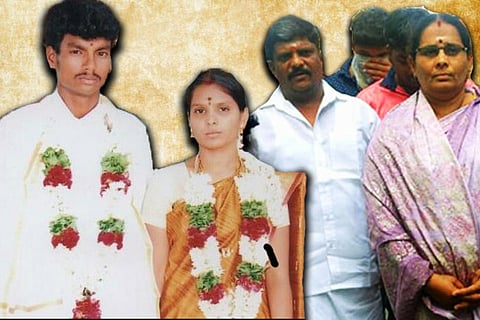

A caste crime that shook Tamil Nadu to its core in March of 2016 sprung shock to its victims four years later. The Madras High Court acquitted Chinnasamy, the prime accused in the murder of a Dalit man, of all charges and ordered his release, prompting outrage from anti-caste activists.
The High Court, on Monday, pronounced its verdict in the murder of Sankar, a Dalit man who was hacked to death in broad daylight in Udumalpet, Tiruppur district. Sankar was murdered in front of his wife Gowsalya, who hails from the dominant Thevar caste, allegedly by her father Chinnasamy who was enraged at the intercaste union.
Chinnasamy who was awarded the death sentence by the Tiruppur district sessions court in December 2017, was acquitted of all charges. He will soon be released from prison based on the High Court’s order.
The acquittal of the prime accused has come as a jolt to many in Tamil Nadu. Anti-caste activists and political leaders have expressed outrage at the court’s orders, highlighting concerns about Gowsalya’s safety.
Speaking to the media following the pronouncement of the verdict, a visibly shaken Gowsalya said that the fight to get justice for Sankar will continue till she is alive.
A common question raised by those who have been fighting for justice alongside Gowsalya is, “What is the need to issue the verdict now, amid a pandemic?”
“This makes us question the entire justice system,” Muthamizh, a close friend of Gowsalya, said. Muthamizh questioned the intention behind pronouncing the verdict in the middle of a lockdown.
“It feels like the verdict was timed to prevent any protests or demands for justice by people close to Gowsalya, otherwise what is the need to do this now?” she asked.
She pointed out that Gowsalya too had suffered injuries in the attack which killed her husband.
Adding that the lack of prior information about the verdict to the aggrieved party (Gowsalya) makes her question the system, she asked, “How is it easy to release a man who has been given a death penalty for having committed a horrific crime?”
Speaking to TNM, Kathir, the founder of the anti-caste NGO Evidence, questioned the pressing need to issue a verdict on the case amid the pandemic.
“This should be seen as the failure of the state government to provide justice to Kausalya. If the court can pronounce this crucial verdict, which has the ability to put so many people in danger, amid the COVID-19 pandemic, it makes us suspect political power play in the background,” he said.
Legal experts, however, attribute the timing of the verdict to a guideline issued by the Supreme Court, which states that no verdict should be reserved for more than three months.
The Madras High Court had reserved its verdict in the case in February 2020.
Thol Thirumavalavan, chief of the Viduthalai Chiruthaigal Katchi (VCK), expressed his disdain at the verdict and reiterated his call for a special law against caste killings.
Stating that the Supreme Court had given elaborate guidelines around caste killings, Thirumavalavan added that the guidelines have not been implemented by the government of Tamil Nadu, even after two years of the court issuing them.
உடுமலை சங்கர் ஆணவக்கொலை வழக்கில் #உயர்நீதிமன்றத்தீர்ப்பு ஏமாற்றம் அளிக்கிறது!
— Thol. Thirumavalavan (@thirumaofficial) June 22, 2020
ஆணவக்கொலைகளைத் தடுக்க உடனே #அவசரசட்டம் இயற்ற வேண்டும்!
உச்சநீதிமன்றத்தின் (2018-தீர்ப்பு) வழிகாட்டுதல்களைப் பின்பற்ற மைய, மாநில அரசுகள் முன்வரவேண்டும் !#ஆணவக்கொலை pic.twitter.com/mn2pFAgkgD
Director-producer Pa Ranjith also tweeted his disappointment at the verdict on Monday. “..I condemn the government of Tamil Nadu for not skillfully conducting the case. On one side, they are releasing convicted criminals before their sentence is over like in the Melavalavu caste crime case and on the other side, they are releasing those who are convicted of murdering someone based on caste. Is social justice an imagination in Tamil Nadu government?,” he asked.
மிகவும் பதற்றத்தை உண்டாக்கிய உடுமலை சங்கரின் ஆணவப் படுகொலை வழக்கில் குற்றவாளிகளை நிரபராதிகள் என்று விடுவித்த உயர் நீதி மன்றத்தின் தீர்ப்பு மிகுந்த ஏமாற்றத்தை அளிக்கிறது. வழக்கை திறன்பட நடத்த இயலாத தமிழக அரசுக்கு கடும் கண்டனங்கள்!! #சமூகநீதியை_கொல்லும்_மனுநீதி
— pa.ranjith (@beemji) June 22, 2020
The Tiruppur district sessions court had, in 2017, awarded capital punishment to Chinnasamy with 10 years’ imprisonment for criminal conspiracy and three years for other charges. He has been housed in the Coimbatore Central Prison since then. The sessions court had acquitted Gowsalya’s mother and uncle and had awarded 18 years’ imprisonment to five contract killers who were allegedly hired by Chinnasamy to do his bidding.
On Monday, the court acquitted Chinnasamy of all charges, but confirmed the conviction of the contract killers and awarded them an imprisonment of not less than 25 years, as against the 18 years’ imprisonment awarded by the district court in 2017.
ARL Sundaresan, the defence counsel, had argued in court that the identification parade held to identify the accused was a ‘farce’.
Pointing to this, activist Kathir asked: if Chinnasamy has been acquitted and released, does that mean the crime happened on its own?
“If the identification parade was a farce, as claimed by the lawyer for the accused, then how did the five contract killers alone get conviction and imprisonment now?” he questioned.
C Lakshmanan, political scientist and Professor at the Madras Institute of Development Studies (MIDS), said that the judgment was a reflection of the lack of shame and sensitivity that seems to be engulfing all aspects of governance in the country now.
“During the coronavirus (pandemic), Tamil Nadu has recorded so many caste atrocities and caste-based killings. These kinds of judgments will certainly give edge towards more violence, more killing and more atrocities,” he said.